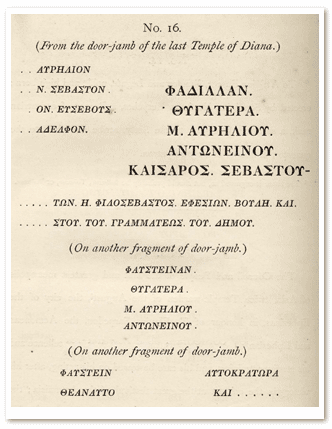

7. Ephesus and Rome, Greek and Latin
Since it was settled by Ionian Greeks in the early Iron Age, Ephesus had been a Greek-speaking city; but sometimes its coins, though issued far later, give hints about its language use, and even its earliest history. For example, the silver coins called cistophoroi ( 4 , 8 , 15 ) are coins meant to circulate in Greek-speaking Asia, but they were issued under Roman overlords, so often their legends are in Latin. These coins spell the name of the city as "Ephesus," which we pronounce "Efesus." (The same is true of the few Roman denarii issued at Ephesus.)

Inscription from the door-jamb of the Artemision.
Copied
and published by J. T. Wood (1877). Fadilla and Faustina
were
daughters of Marcus Aurelius.
Now, the end syllable is no problem - where the masculine ending of Greek was '-os,' Latin's was '-us,' and they probably sounded rather similar. But Latin had a perfectly good 'f' sound too, which the coin-designers did not use for the name of the city. The 'ph' in the Latin form of "Ephesus" means that the city name was likely pronounced with an aspirated 'p' - which means that it actually would have sounded more like "Epesos" to English-speakers.
This is where the clue to the city's early history comes in. In Hittite records, the kingdom of Arzawa, which historians often locate in western Anatolia, had a major city called "Apasa." It is the similarity in the basis of the names - two identical vowels separated by an aspirated 'p' - that prompts scholars to hypothesize that the Arzawan city was Ephesus.
Ephesus' coinage also gives clues as to how Latin was pronounced. The
Latin consonant 'v' - which had at first been pronounced as if it were
our 'w' - slowly began to change to a true 'v' sound during the time
that Ephesus was issuing coins. Greek, however, had no single letter
that corresponded to either sound. The closest Greek letter to the 'v'
sound was beta, which itself was slowly changing from a true 'b' to
a 'v' sound, which it has in modern Greek today. Apparently the Latin
sound change - 'w' to 'v' - was most pronounced after liquid sounds
- 'l' or 'r.' This is why part of the emperor Trajan's name is spelled "Nerba" in
Greek ( 27 ) on Ephesus' coins at the beginning of the second century
CE. As late as the third century CE, however, there was no settled way
of pronouncing - or transliterating - the Latin 'v.' This is shown by
Ephesus' coins with portraits of the emperor Valerian (253-260 CE):
sometimes his Latin name "Valerianus" is spelled as "Balerianos" (
34 ), meaning that its initial letter was pronounced 'v,' but sometimes
it is spelled "Oualerianos", which is the closest that Greek
could get to the Latin 'w' type of 'v' - by pronouncing it as a dipthong,
'oo-a.'
This makes the coins of Ephesus crucial documents that show how ancient
languages were actually pronounced in their time.




